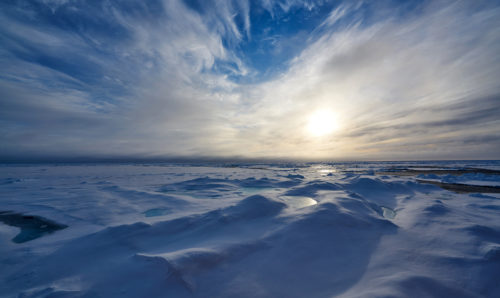The onset of climate change has brought unprecedented challenges to every landscape, but none so rapid and dramatic as in the Arctic. Leaders in the public and private sectors agree that nations must prepare for how the North’s shifting climate will impact geopolitics, economics, and security across the globe.

For the conference “Circling the Arctic: Security and the Rule of Law in a Changing North,” Penn Law’s Center for Ethics and the Rule of Law (CERL) and the Annenberg Public Policy Center (APPC), along with the Polar Institute at the Wilson Center, convened more than 30 legal, military, communication, and political experts, including U.S. Sen. Angus King (I-ME), to discuss strategies to address the challenges presented by climate change’s dramatic effect on the Arctic.
“There is perhaps no more vital issue in global and American security today than the effect of climate change, and those effects are being felt acutely in the Arctic region,” said Alexandra A.K. Meise, a senior fellow at CERL. Claire Finkelstein, CERL’s founder and faculty director, said the conference focused on “understanding climate change as a national security concern of the first order.”
(Read the conference report here. And read a report by Alexandra Meise on this issue, Lessons from the Arctic: The Need for Intersectoral Climate Security Policy.)
Each session of the three-day conference from October 1-3, 2020, which had four virtual public and five closed sessions, revolved around the idea that national security strategies in the Arctic regarding climate change must accomplish four goals. These are to increase public knowledge of the Arctic; enhance operational capacity in the region; promote human security; and strengthen applicable rule-based order.
“Until very recently the Arctic, as a foreign policy matter, has been the subject of a high degree of cooperation – a low-threat, low-tension region,” said David Balton, a senior fellow at the Polar Institute and former Ambassador for Oceans and Fisheries in the U.S. State Department. “At the moment, however, the Arctic is facing a number of extraordinary challenges. … One of them, of course, is warming. The Arctic is in fact warming more than twice as fast as the planet as a whole, and that is having profound consequences for the region and the people who live in it, and then has potential consequences for the planet as a whole.”
The first public panel, moderated by Meise, was Engaging Arctic Nations: A Conversation with Security Leaders on Strengthening Arctic Security Cooperation, which included General (Ret.) Joseph L. Votel; Björn Fagerberg, Counselor and Head of Political Affairs at the U.S. Embassy of Sweden; and Sherri Goodman, a public policy fellow at the Wilson Center and Secretary-General of the International Military Council on Climate and Security.
The panelists considered ways that Arctic nations can work together to better address security risks in the face of climate change’s upheaval. The rapid shifts in climate may usher in a “potential era of geostrategic competition” due to the region’s vast natural resources and increasing accessibility, Goodman said.
The second public panel, on Communicating the Climate Change Security Threat, moderated by APPC director Kathleen Hall Jamieson, featured a series of short presentations and a Q&A session in which communications scholars discussed how national security, scientific, and political experts should communicate the urgency of climate threats to a sometimes-skeptical public.
“In this highly polarized environment,” Jamieson asked, “what kinds of communication cues can be presented … to which audiences are likely be receptive, and to what extent can they overcome climate skepticism and effectively communicate the nature of the crisis and the need for action now?”
Asheley Landrum, an assistant professor of communication at Texas Tech University and a former APPC postdoctoral fellow, said that one of the largest obstacles to communicating climate science is that much of that skepticism is driven by party polarization. She said the “growing tendency of individual Americans to treat party identification as a type of social identity, just as they would their religious or cultural subgroups” makes it difficult for scientists to overcome an assumed association with liberalism and communicate with conservatives in a way that bolsters scientists’ credibility and trustworthiness.
Dietram Scheufele, a professor of communication at the University of Wisconsin-Madison and an APPC distinguished research fellow, suggested the use of “framing strategies” to communicate “across tribal fault lines.”
“Framing is the idea that … by using certain terminology or imagery, [communicators can] set the frame of reference in which any given piece of information is being processed,” he said. “ … By changing the terminology, [they] will make it more likely that audiences will connect to different mental schema.” He said that one could encourage investing in green energy among a conservative audience by speaking in framing that would also appeal to conservative value systems, for instance, focusing on investing in long-term, profitable, renewable energies, rather than downsizing coal plants and implied job losses.
Others on this panel included Matthew Nisbet, a communication professor at Northeastern University, and Bruce Hardy, an assistant professor of communication at Temple University and a distinguished research fellow at APPC.
Hardy presented research that he and Jamieson conducted on climate trends and the extent of Arctic sea. They found that by asking specific, fact-based questions, communicators can encourage their audience to focus less on adhering to ideologies and more on understanding crucial facts. During the Q&A session, Jamieson noted that communication that appeals more to “accuracy motivation, the basic human need to get things right” could help an audience overcome a partisan mindset.
Among other events, the third morning featured a “coffee talk” with King, co-chair of the Senate Arctic Caucus and a member of the Senate Energy and Natural Resources Committee, on the U.S.’s arctic strategy.
Closed-door meetings at the conference included topics such as identifying strategic impacts of a changing Arctic, increasing militarization and potential for resource conflicts, ramifications of economic development, and heightened threats to human security.
The final public session addressed governance mechanisms affecting rule of law in the region, including the participation of Indigenous peoples in mechanisms such as the Arctic Council and the importance of UNCLOS (the United Nations Convention on the Law of the Sea) to the Arctic. Moderated by Balton, the speakers included Hon. Inuuteq Holm Olsen, Head of Representation for Greenland in the United States, Dalee Sambo Dorough, International Chair, Inuit Circumpolar Council, and Lassi Heininen, Professor of Arctic Politics, University of Lapland.
Download the conference report.


